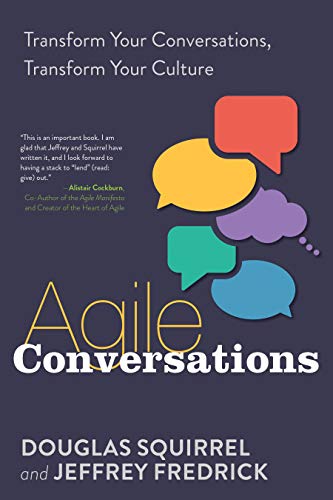Agile Conversations: Transform Your Conversations, Transform Your Culture Link to heading
Summary Link to heading
“Agile Conversations: Transform Your Conversations, Transform Your Culture” is a book by Jeffrey Fredrick and Douglas Squirrel that delves into the importance of conversations in improving organizational culture and facilitating agile transformations. The authors base their insights on their combined experience in software development and management, asserting that clear, honest, and effective dialogue is essential for successful collaboration and problem-solving within teams.
The book outlines five specific types of conversations critical to fostering a culture of continuous improvement:
- Trust Conversations - Building trusting relationships through transparency and vulnerability.
- Fear Conversations - Addressing fears and concerns openly to prevent them from obstructing progress.
- Why Conversations - Clarifying motivations and aligning goals by exploring the ‘why’ behind actions and decisions.
- Commitment Conversations - Ensuring clear agreements and responsibilities among team members.
- Accountability Conversations - Creating a culture of accountability where feedback is constructive and growth-focused.
These conversational frameworks are designed to help teams navigate the complex social dynamics of agile environments and drive positive cultural change.
Review Link to heading
“Agile Conversations” offers a fresh perspective on the agile transformation process by highlighting the human element of communication. A key strength of the book is its practical approach, providing readers with specific tools and techniques to improve their conversational skills. The use of real-world examples further grounds the concepts in relatable situations, making the strategies more accessible and applicable.
However, some readers may find the book’s focus on conversations potentially overlooks other technical or structural elements of agile transformations. While the book emphasizes conversations as foundational, it might not deeply address how these conversations interact with broader system processes or technical practices.
Overall, “Agile Conversations” effectively bridges the gap between communication and agile success, making it a valuable resource for individuals looking to enhance team dynamics and organizational culture.
Key Takeaways Link to heading
- Conversations are the Cornerstone of Culture: Open dialogue is crucial for improving team dynamics and achieving agile success.
- Vulnerability Builds Trust: Being open about failures and fears fosters stronger, trust-based relationships within teams.
- Clear Motivations Align Goals: Understanding the ‘why’ behind actions ensures team members are working towards the same objectives.
- Explicit Commitments Drive Accountability: Clearly defined agreements help maintain responsibility and follow-through within teams.
- Continuous Feedback is Essential: Regular accountability conversations promote growth and improvement.
Recommendation Link to heading
“Agile Conversations” is highly recommended for leaders, managers, and team members engaged in agile environments who aim to improve their organizational culture and team interactions. The book’s actionable insights into communication can benefit those looking to address interpersonal challenges and build more effective and collaborative teams across various industries.
